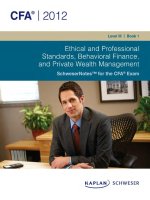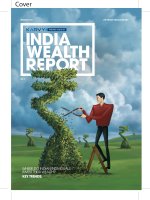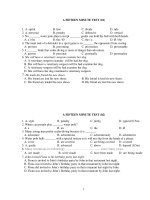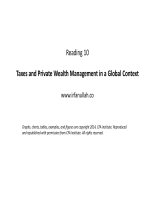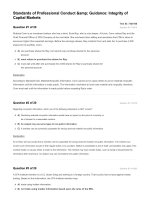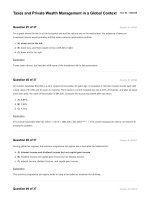Q a schweser self test 03 private wealth management question
Bạn đang xem bản rút gọn của tài liệu. Xem và tải ngay bản đầy đủ của tài liệu tại đây (149.02 KB, 3 trang )
Use the following information for Questions 1 through 6.
Chen Wang and his wife, Tao, have been married for nearly 30 years, during which time they have
enjoyed enormous business success. The Chens started their marriage as small shopkeepers and
grew their business rapidly. They turned their first shop into a successful chain of retail stores. From
that base, they expanded into global trading. Eventually, they began to manufacture a variety of
items for sale in both their own stores and for export.
After diversifying their business geographically and integrating vertically, the Chens broadened their
business interests into real estate. Their holdings expanded beyond their initial investment in
residential apartments into large commercial spaces and office buildings. Ultimately, they parlayed
their first small business into a large conglomerate, incorporating several industries on both sides of
the Pacific. Even though Chen Wang is 61 and his wife is 58, they remain very active in running their
businesses.
In addition to their varied business interests, the Chens have a substantial portfolio of marketable
securities. Although they have historically managed their securities portfolio themselves, they
decided to bring in a professional adviser once the portfolio exceeded 100 million Hong Kong dollars
(HKD). They consulted Park Jung Hee, CFA, about the asset allocation and security selection in
their investment portfolio.
The Chens told Park, "We have two grandchildren, and we would like to be able to leave each one
100 million HKD in today's dollars (i.e., in real value) of marketable securities in our estate." Park
reminded the Chens that they could expect to enjoy long lives, but Chen Wang responded, "Kindly
plan our investments so the portfolio reaches the target by the time I am 75." Park points out that the
current value of the portfolio is already 102 million HKD, so that goal should be reachable, especially
because the Chens are not subject to income taxes on portfolio income or capital gains.
The Chens would also like to fund some charitable activities. "If the portfolio can afford it, we would
also like to give 1 million HKD per year to various organizations," Chen Tao tells Park. "And we
would like to increase that figure every year for inflation," adds Chen Wang. Park and the Chens
agree to plan for an inflation rate of 1% per year.
Park reviews the current holdings in the portfolio with the Chens. He notes that the portfolio contains
nearly 20 million HKD of equity in the Golden Flower Trading Company (GFTC). The Chens have
had GFTC in their portfolio for several years because they consider it a good company. Park advises
them, however, to sell some of the position in order to diversify their portfolio. Chen Wang points out
to Park that GFTC has fallen 15% from its high, reached several months ago. "We don't want to lose
money, so please wait to sell until it comes back."
Chen Tao has also expressed some reservations about leaving the the grandchildren such large
sums of money and asks for recommendations that would be a cost effective way to provide the
benefits of the money over an extended period of time to the grandchildren. Park promises to get
back with some suggestions.
................................................................................................................................................................
Question #1 of 6
Based on the Chens' situation their least likely need for insurance is to manage:
A) Longevity risk.
B) Property risk.
C) Liability risk
Question #2 of 6
Which of the following is least likely to be included in the five main classes of investment
constraints?
A) Regulatory and legal constraints.
B) Risk tolerance.
C) Time horizon.
Question #3 of 6
The return objective on the portfolio necessary for the Chens to reach their investment goals
is closest to:
A) 4.5%.
B) 5.5%.
C) 6.5%.
Question #4 of 6
Chen Wang's reluctance to sell GFTC until it returns to its earlier high is best described as:
A) regret.
B) anchoring.
C) myopic loss aversion.
Question #5 of 6
Park suggests to Chen Wang that derivatives can be used as an alternative to an immediate sale as
a way to reduce the risk in GFTC. In order to retain all of the security upside and minimize initial
cost, Park would recommend:
A) a collar.
B) an at-the-money protective put.
C) buying an OTM put and sell a further OTM put.
Question #6 of 6
Based on the Chen Tao's objectives, Park is most likely to recommend:
A) Term life insurance on the grandchildren.
B) A deferred start annuity with the grandchildren as the annuitants.
C) A discretionary trust with the grandchildren as the beneficiaries.
